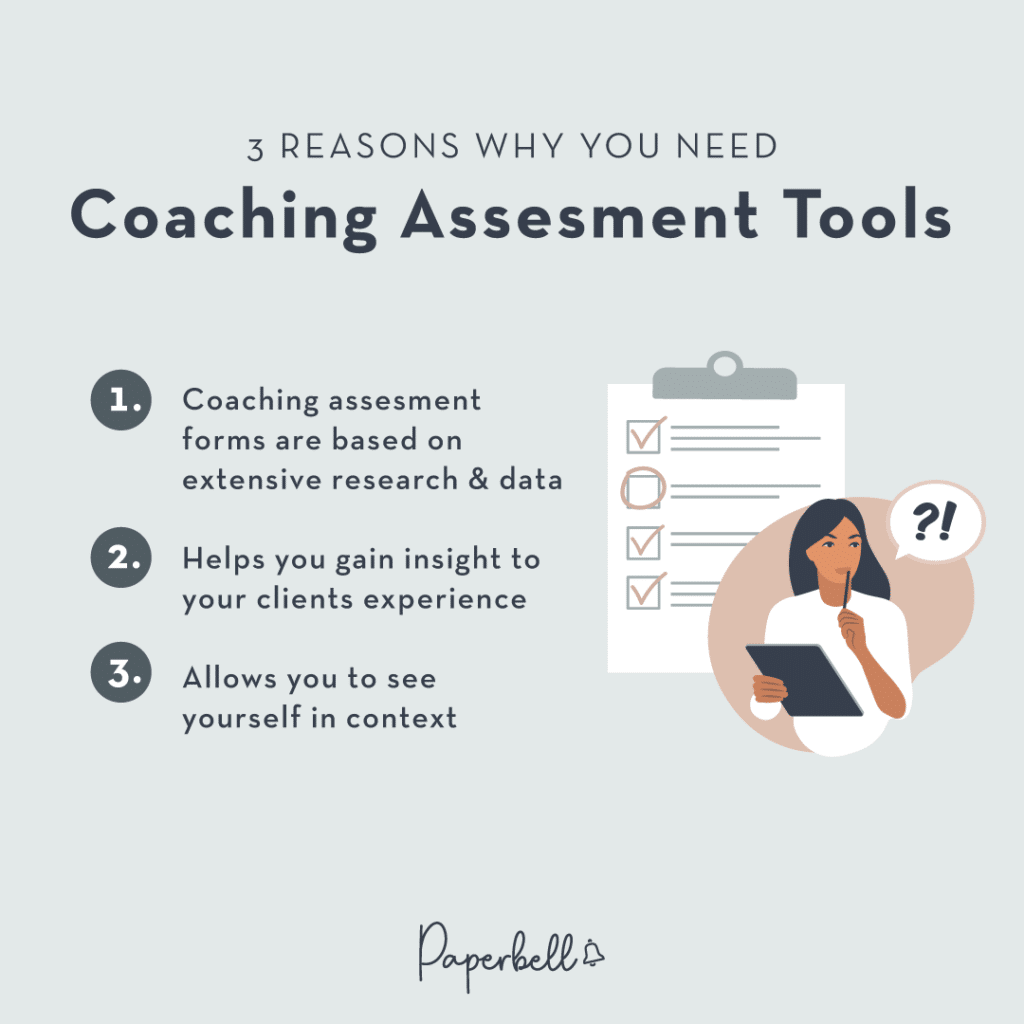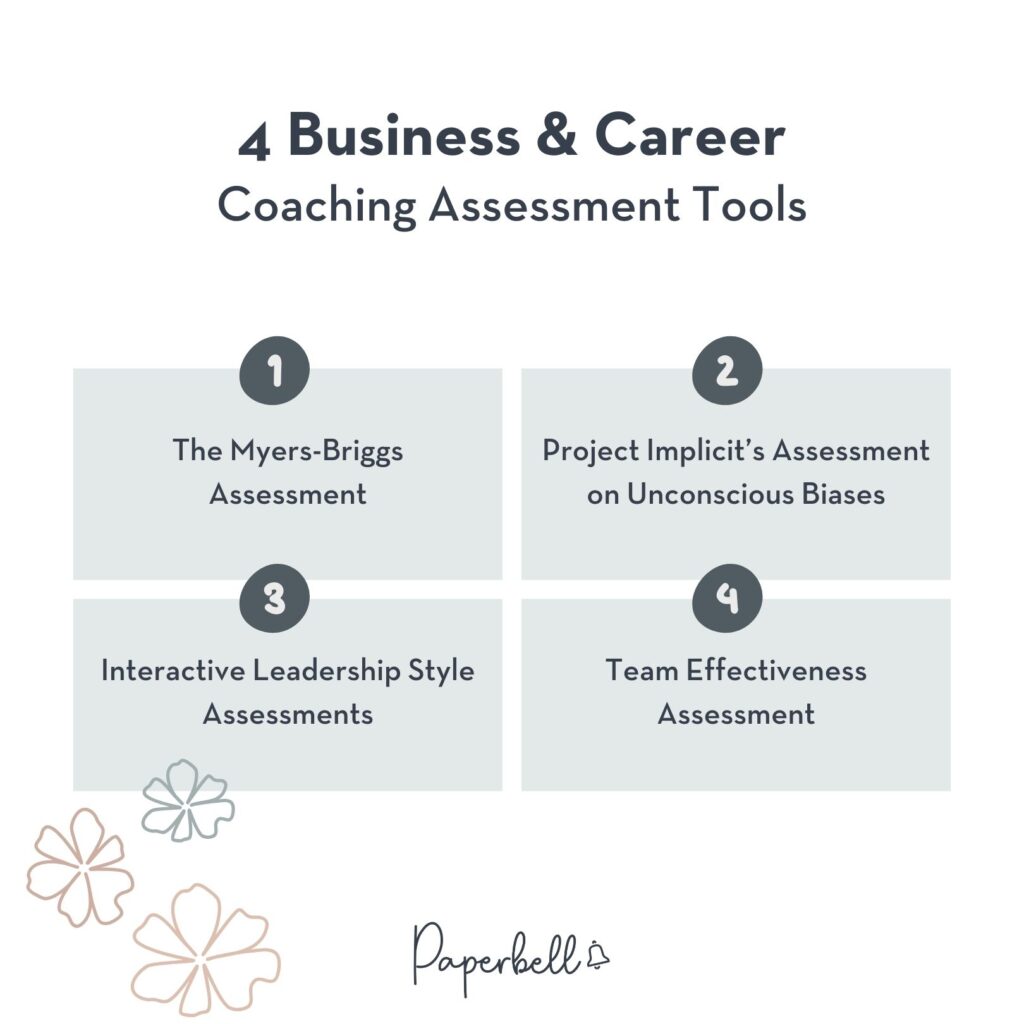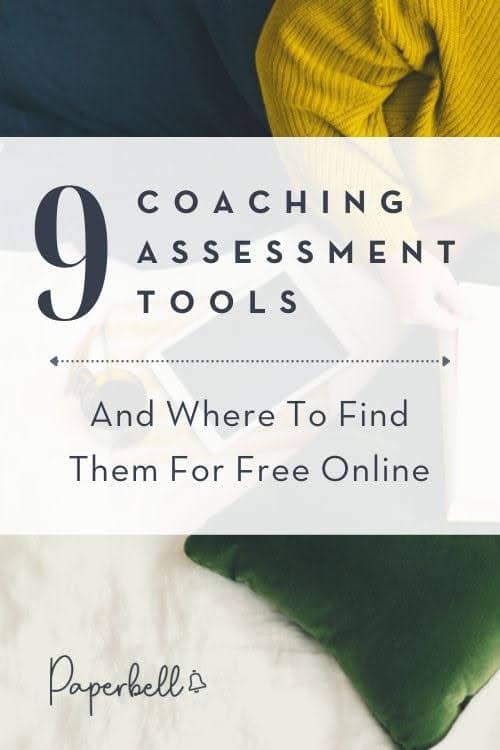Note: This article is a guide for coaching assessment tools. If you’re looking for coaching tools in general, check out this article on our blog.
The first step to creating transformation for your clients is helping them understand themselves on a deeper level.
Coaching assessments are invaluable tools for gaining structured insights into the personality and behavior of a client. They let you create more personalized coaching strategies that accelerate your clients’ growth.
Here are some of the best assessment tools for coaches (a list you might want to save for later).
But First, Why Do You Need Coaching Assessment Tools?

Your job as a coach is to help your clients reflect on where they are in life so they can move in the direction they desire.
We all love an “aha” moment during a session. When our client’s eyes sparkle in that moment of silence, we know they’ve just discovered something important about themselves.
But if you’ve been coaching for a while, you also know that a lot of the work happens in between sessions.
We don’t always process information in real-time, and we often need a day or two to reflect or hear the same insight from another source for it to land.
Additional materials can deepen the insights your clients experience and help them arrive more prepared for the next session.
The other reason why a great coaching assessment tool can supercharge your sessions is that they are basically concentrated versions of a scientific experiment. Most coaching assessment forms are based on extensive research and data, distilled into a compact, easy-to-use tool for pattern recognition.
It allows us to see ourselves in context: What our personality and competence look like, what we’re missing, and how our values and talents set us apart from other people in our lives and careers.
And since the first step to creating change is clarity, these assessments are essential to put these puzzle pieces together. They give you more material to work from so you can guide the people under your wings through transformation faster and more effectively.
So How Do You Know Which Coaching Assessment Tools to Use?
To choose the right assessment tool, you need to look at two things: credibility and relevance.
As a coach, you should only use assessments that have been well-researched and validated.
Of course, not all clients are created equal, and you never know where the next big insight might come from. But it’s important to differentiate the tests that are mere entertainment (such as pop culture quizzes) from the ones that come from a credible source (just like the ones below).
The other important thing to consider is whether the assessment is relevant to the goals set in the coaching process. Is your client looking for a new, more fulfilling career? Do they have conflicts with their manager or their team members?
Define the question your client is trying to answer for themselves and choose the right assessment based on that.
Note that some might take an hour to complete, while others can be finished in minutes. It’s always good to set clear expectations before you assign them as homework to respect your client’s time.
Okay, My Client Filled Out the Assessment. What’s Next?
If the work was done right then and there, they wouldn’t need you as a coach, right? This is the time to dig into how they can use this information to advance in their life and career.
Some assessment tools do a great job concluding results, while others require you to provide more context to your coachee. So first, get clear on what their assessment results mean.
Next, ask your coachee to reflect on that information
- Do they resonate with it?
- Do they disagree with it?
- What have they learned about themselves?
- Which part of it was the most surprising?
These questions will be just as important as the assessment itself. They will allow the client to verbalize how they see themselves in the context of their environment and define the parts of themselves they aren’t happy with, i.e., the parts they want to change.
And, you guessed it, that’s exactly the change they came to you for in the first place.
So let’s look at some of the most effective business, career, and life coaching assessment tools to help you move your clients forward.
Life Coaching Assessment Tools

The Big Five
The Big Five Aspects Scale was developed by Dr. Colin DeYoung, Dr. Lena Quilty, and Dr. Jordan B Peterson, author of 12 Rules For Life. These scientists have gathered data from thousands of people across the world and have identified five universal aspects of human characteristics.
This 100-item test goes beyond the usual dimensions personality quizzes look at and helps individuals see themselves in a more nuanced way. They look at these five personality aspects and break them down into further variables:
- Extraversion
- Neuroticism
- Agreeableness
- Conscientiousness
- Openness to experience
In the end, your client will receive a detailed report about their character traits that they can use to understand themselves better in their relationships, career, and life in general.
VIA Inventory of Strengths
The VIA Character Strengths Survey is a free coaching assessment form that takes less than 15 minutes to fill out and allows your clients to gain new insights about their biggest strengths and weaknesses.
The VIA Institute of Character lists 24 main strengths and their definitions, out of which five will be highlighted as main strengths and five as lesser strengths.
This assessment isn’t as much about building your competence in certain areas, but about discovering your natural strengths or gifts and focusing on them to become more successful in life.
Interestingly, these strengths often overlap with our values, which shows that what we value the most is what we get good at.
The Mindvalley Assessment
Mindvalley, the leading transformational education platform has partnered with Lifebook, the lifestyle design framework to create a 360 life assessment.
This tool is perfect for life coaching sessions as it explores the level of awareness your clients have in twelve different categories of their lives. It provides a compass in terms of what your coachee needs to focus more on to feel more balanced and fulfilled.
This will give you clarity on the problems they face and what your coaching sessions should revolve around.
5 Love Languages
Knowing what our love languages are is essential for nurturing conscious and thriving relationships in our lives.
The 5 Love Languages assessment helps your clients discover how they (secretly) want to give and receive love from their romantic partner, friends, and family. It gives them a definition for each love language.
This free coaching assessment tool isn’t just handy in relationship coaching, but also as a team-building tool in the workplace. Plus, it helps you build a rapport with your coachee and understand how to best communicate with them.
Enneagram
Enneagram divides character traits into nine primary personality types in a number system. The assessment is based on our motives and fears influenced by biological factors and environmental influences, such as family dynamics or parental relationships.
What’s interesting about the Enneagram assessment is that it doesn’t just describe your personality as a static character, but also the nuances of how our behaviors change when we are high or low on confidence.
Business and Career Coaching Assessment Tools

The Myers-Briggs Assessment
The Myers-Briggs test is one of the most widely known assessment tools used by individuals and companies worldwide. The 16 personalities test is a free version of this tool backed by hundreds of studies that offers detailed explanations about each personality type.
Your coachee can use it to educate themselves about what career path might suit them, how they behave in relationships, and even their workplace habits.
Project Implicit’s Assessment on Unconscious Biases
This coaching assessment tool should be a must-have in all workplaces. Seriously. Especially the ones that operate with culturally diverse teams or with few women on board.
This coaching assessment form was developed by scientists from Harvard University and other notable research institutions, focusing on unconscious biases toward certain societal groups.
We all have biases towards or against certain groups of people. Sometimes even in relation to a group that we are a part of, e.g., seeing men as more competent than ourselves as women (crazy, right?).
By helping your clients make these hidden biases conscious, you can help them reshape their beliefs about others (and themselves). In a workplace setting, this will allow them to become better collaborators as well as more equitable and effective leaders.
Interactive Leadership Style Assessments
Growing into a better leader has a lot to do with discovering one’s unique leadership style. This is relevant for corporate leaders and entrepreneurs, but also for community builders, group facilitators, and transformational guides like us–coaches.
Every professional context and life situation demands a different leadership style, so it’s best to ask your coachee to fill out the questionnaire with a particular situation in mind.
[ Read: 71 Leadership & Business Coaching Quotes to Inspire Your Clients ]
Team Effectiveness Assessment
If you’re working with team leaders or organizations, this is a great assessment tool to measure how well a team functions. According to Harvard Business Review (HBR), three out of four cross-department teams are dysfunctional because of issues regarding coordination, motivation, or competition.
If you’re an organizational coach, these numbers scream for your help. HBR’s assessment is a great starting point for working with a team so you can create the right coaching plan for them.
Over to You
Human beings are complex (that’s the beauty of coaching), so no one assessment is sufficient to solve all the problems your clients face. However, they are a great set point to use at the start of a coaching engagement or in between sessions to uncover the focus for their desired transformation.
If you want an easy way to store your coaching materials and surveys for all your clients and packages, give Paperbell a try. It’s an all-in-one client management tool that also handles your bookings, contracts, payments, and more. Check out all its cool features with a free account.

Editor’s Note: This post was originally published in June 2021 and has since been updated for accuracy.









